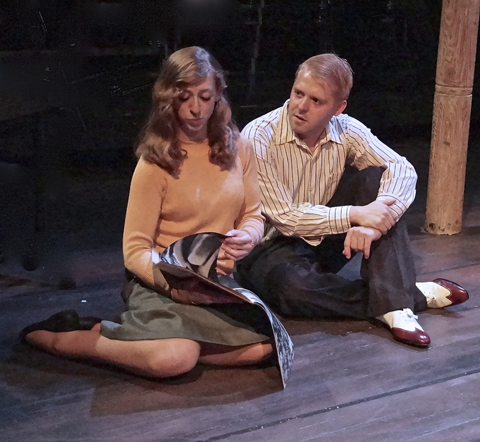 IN SEARCH OF LOST TIME A View’s Catherine and Rodolpho navigate an impossible love. |
“I’m inclined to notice the ruins in things,” ponders Alfieri (Brent Askari), the lawyer-narrator of Arthur Miller’s agonizing, classically styled tragedy A View from the Bridge. He’s recalling the downfall of a longshoreman who won’t give up a misplaced, misshapen love, a story that receives a superbly harrowing production at Mad Horse, under the direction of Christopher Price.
We’re in Red Hook, New York, “where the gullet of New York swallows up the tonnage of the world,” as Alfieri laconically intones. In conspiratorial monologue, amiable but haunted, the lawyer (Askari is at his best and most nuanced in the role) reveals to us hardworking Italian-American Eddie Carbone (William McDonough III), husband to Bea (Christine Louise Marshall) and too-doting uncle of nearly-eighteen Catherine (Kat Moraros). When the family takes in two illegal Italian immigrants, Marco (Burke Brimmer) and blonde, handsome Rodolpho (Nate Speckman), Catherine’s youth and Eddie’s unrivaled hold on her start slipping away—natural changes to which Eddie’s unalloyed obsession cannot yield.
Price has a superb sense of space and isn’t afraid of stillness, often holding actors in tableaux that physicalize the unbending rigidity of Eddie’s tragedy. His direction of Eddie’s fall is breathtakingly intelligent, is an object lesson in the fact that tragedy is more affecting when it doesn’t shout itself, and most crucial to View’s success is McDonough’s exquisitely drawn, formidably ordinary Eddie. He plays him down low, gently slouches his shoulders, avoids other people’s eyes, and furrows his brow; his colloquial Brooklyn patois of “youse” is utterly credible in his mouth. When Eddie tells Catherine disapprovingly that she’s “walkin’ wavy”—the very beginning of the escalation—McDonough doesn’t play it for a laugh, doesn’t make a caricature of Eddie’s repressed lust, and doesn’t burden the remark with foreshadowing of where it’s long clear it will lead.
As his too-aware, hard-suffering wife, the excellent Marshall makes achingly measured work of Bea’s changing gaze at her husband, moving through bemused caution, irritation, rage, and finally a hurt, horrified revulsion. Moraros poses a contrast as she soars high and birdlike with Catherine’s exuberance, but then grounds her for her growing ambivalence, as when she smiles and twitches uncertainly at Eddie’s remark that she looks like a “Madonna type.” Later, she is startlingly affecting in her breakdown scene, as she crumbles under the absurdity of having to cut Eddie out of her life.
Rodolpho, the charismatic catalyst, has in Speckman’s hands the charm but not quite the slender, aesthetic grace—nor the singing voice—that someone like Eddie would be moved to consider at once homosexual and a threat, but Speckman capably raises the tension as the household implodes (though his accent could use some polishing). As his older brother, Brimmer demonstrates himself as, more and more, one of Portland’s most versatile and graceful actors. His Marco is subtle, fluid, and speaks—in very convincing Italian accent—like he breathes. Supporting roles, too, are strong: Robbie Harrison leads Christopher Hoffmann in a brief but perfectly funny scene as Eddie’s two buddies can’t stop laughing at Rodolpho’s difficult-to-describe comedic appeal, Harrison spitting pieces of apple with hilarious abandon.